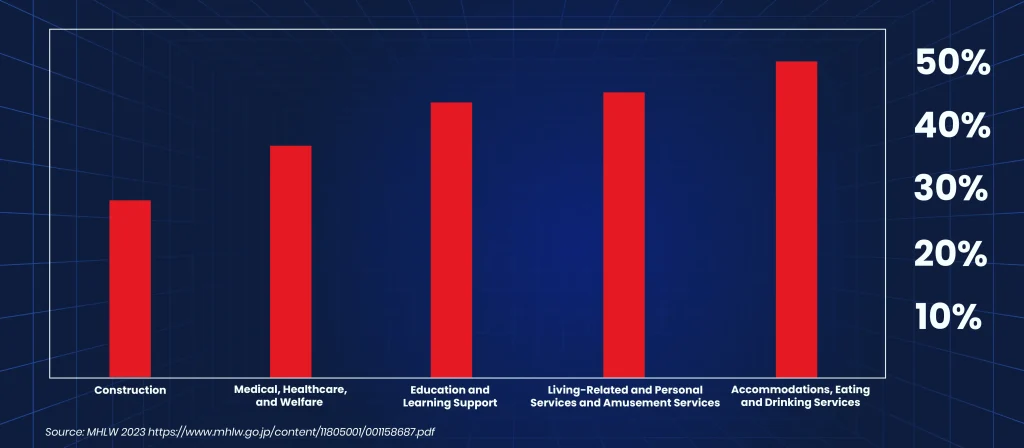Japan’s construction industry is facing a growing labor shortage. Fewer young Japanese people are joining the sector, while many older workers are nearing retirement. Tough working conditions, low job appeal, and changing career goals are making it harder to attract new talent. This trend puts future construction projects at risk.
Is your company ready to reverse this trend?
In this blog, you will learn why young Japanese workers are moving away from construction and what actionable steps you can take to resolve it.
Table of Content
Youth Employment Policy in Japan
The Aging Workforce in Construction and the Decline of Young Talent
Why Young Workers in Japan Are Avoiding Construction Careers
Negative Image of Construction Work
Challenging Working Conditions
How Japan’s Construction Manpower Shortage Worsened by the Decline in Young Workers
Solving Japan’s Construction Labor Shortage with Young Workforce
Implement Work-Life Balance Reforms
Offer Clear Paths with Wage Progression
Establish Zero-Tolerance Policies
Youth Employment Policy in Japan Through The Years

Benefits of Japan’s Youth Employment Promotion AcT
Recognition of Youth as Future Assets
Young people in Japan are seen as the foundation of the future workforce and should be supported to develop their skills and lead fulfilling careers.
Clarified Responsibilities
The law defines the roles of companies, local governments, and human resource dispatch companies in helping youth find suitable employment.
Penalties for Violating Labor Laws
Companies that break labor-related laws can be temporarily banned from recruiting through Public Employment Security Offices.
Greater Transparency for Employers
Companies offering jobs to new graduates must provide clear, accurate information on working conditions, hiring practices, training programs, and employment management.
Youth Yell Certification
A new recognition system for small and medium-sized enterprises (SMEs) that actively supports and trains young employees, promoting good youth employment practices. (“Yell” symbolizes encouragement.)
Stronger Support Structures
Existing youth employment support organizations were formalized under the law.
The Aging Workforce in Construction and the Decline of Young Talent
Japan’s aging workforce in construction has become a major concern in recruitment. A recent study discussed that over 30% of workers are now 55 or older, while less than 10% are under 30. This imbalance is not sustainable.
As older and experienced workers retire, there are not enough young professionals to replace them, leading to a growing skilled labor shortage.
The shrinkage of the youth workforce is due to the demographic crisis (the aging of society coupled with a chronically low birth rate.) – IWAWAKI Chihiro
Why Young Workers in Japan Are Avoiding Construction Careers
The decline of construction workers in Japan among the youth is driven by several factors and understanding them is important in addressing the skilled workers gap.
1. Negative Image of Construction Work
Japan’s construction industry is often viewed by young people as outdated and physically demanding. Safety risks and limited career growth contribute to this image. Many young Japanese prefer industries that offer better work-life balance and technological innovation, such as IT or finance.
2. Urbanization
Urbanization is another reason for the labor shortage. Many young people move to big cities for school or office jobs, leaving fewer workers available for rural construction projects. In addition, Japan’s culture values stable and prestigious careers, so construction work is often seen as a “last option” especially among university graduates.
3. Challenging Working Conditions
Long hours and tough job conditions make construction work less attractive to young people. On account that today’s younger generation values work-life balance more than ever. They want jobs that offer steady income, personal satisfaction, and time for rest and hobbies. This shift in priorities is pushing many away from the construction industry.
Dispatch Services in Japan’s Manufacturing Industry: A Strategic Guide for Recruitment Managers
Discover how you can maximize dispatch services to solve labor shortages, reduce costs, and boost productivity in Japan.

How Japan’s Construction Manpower Shortage Worsened by the Decline in Young Workers
The construction manpower shortage in Japan is already affecting real projects.
Public infrastructure is facing delays, private construction struggles to stay on schedule, and costs are rising across the board.
At the same time, it’s hard for young job seekers especially those without regular work experience to find stable employment. In Japan, when an employee leaves their jobs too soon, they are often seen as unfit for mid-career positions. This limits their chances of getting hired again.
Recent data reveals clear differences in employment rates among young Japanese university graduates across various sectors:

A significant proportion of young workers in Japan are employed in service-oriented industries while lower percentages are seen in construction.
For Japanese companies, early resignations strain recruitment costs. Training investments are wasted when new hires leave soon after onboarding. This not only affects productivity but also raises concerns for the construction companies to maintain a stable workforce.
Solving Japan’s Construction Labor Shortage with a Young Workforce and Sending Organizations
Young people in Japan moving away from the construction industry is a pressing issue that requires immediate attention and innovative solutions. After having a clear understanding of the causes driving this demographic shift in the latter part of this blog, it’s about time to reverse this trend.

Launch Nationwide Campaigns
Modernize the image of the construction industry aiming to capture the interest of the younger audience. Highlight advancements in construction technology including the integration of BIM, AI, drones, automation, and the like.
This approach not only enhances recruitment efficiency but also attracts tech-savvy young individuals who seek dynamic roles within their careers.

Implement Work-Life Balance Reforms
Invest in modern equipment to reduce physical fatigue, and promote safety-first practices to create a more sustainable work environment. Infuse mandatory rest periods, implement better work scheduling, and if possible, shorter shifts. When companies show care and understanding for young workers’ well-being, they are more likely to stay motivated and perform better.
Partner with a Trusted Sending Organization
A human resource dispatch company can help ease recruitment challenges in Japan’s construction industry. With access to a wide pool of talent, they can quickly provide skilled workers when needed. Leveraging this advantage allows construction companies to fill labor gaps efficiently and maintain smooth, uninterrupted project operations.
Conclusion
Japan’s construction industry stands at a critical crossroads. With the steady decline of young workers and the looming retirement of older professionals, immediate action is essential. Young people are increasingly drawn to careers that offer better work-life balance, job security, and opportunities for personal growth—qualities that the construction industry has struggled to provide.
By addressing these challenges right away, construction companies can begin to rebuild interest among the younger generation. With the help of meaningful reforms, incentive programs, and most importantly, establishing strategic partnerships with a human resource dispatch provider like Greatways Manpower International, Japan’s construction sector can become more appealing and sustainable.
Why Partnering with Great Ways Is Your Best Move Yet
As Japan’s construction industry faces an escalating labor shortage, partnering with Greatways Manpower International can be the game-changer you need. Gain access to a pool of skilled, dependable workers and streamline your recruitment process.
At Greatways, we help keep your projects on schedule while meeting your current and future staffing needs.
Struggling to find skilled workers for your construction projects?
Streamline your recruitment process with Greatways and secure the skilled workforce your business needs for long-term success.
PARTNER WITH GREATWAYS TODAY





